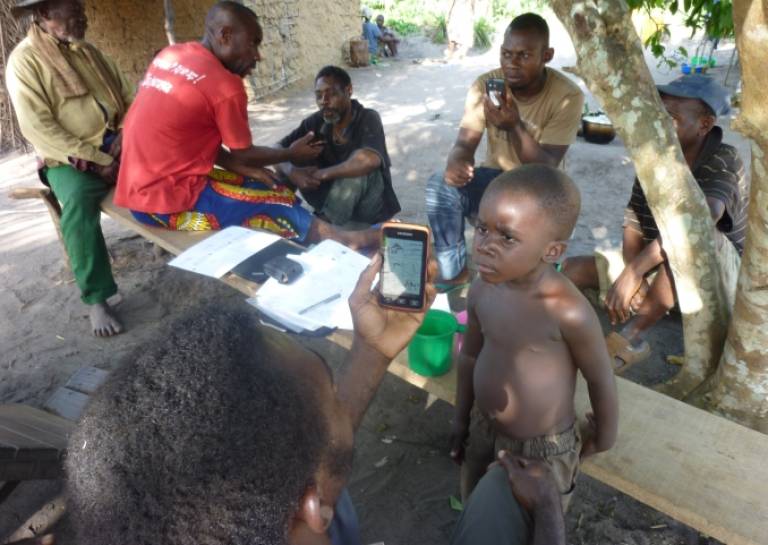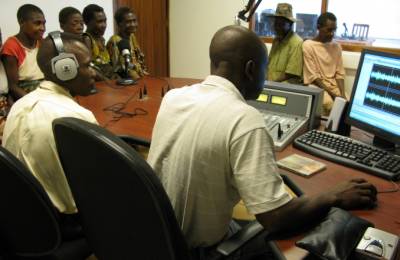Promoting environmental justice and social sustainability in the Congo Basin

16 December 2014
Dr Jerome Lewis led the development of guidelines for Congo Basin logging companies to obtain free prior and informed consent from indigenous communities. These guidelines were used by logging companies and the Forest Stewardship Council and were supported by a training centre, community radio, and innovative participatory mapping techniques.
The Congo Basin, straddling six countries in central Africa, is the second largest rainforest in the world. It is also home to hundreds of distinct ethnic groups, including many whose lifestyle and identity is closely tied to this forest. In recent decades, however, local forest people have lost control over their traditional areas as governments rent out rights to natural resources to international organisations. These logging, mining and plantation companies, and conservation organisations, obtain rights over local resources through central government, without any requirement to consult local people.
With Dr Luke Freeman, Dr Jerome Lewis (both of UCL Anthropology) conducted research on how to implement the concept of free, prior and informed consent (FPIC) in the relations between forest dwellers and powerful companies. They found cultural differences between Northern ideas of consent (a signature) and local ideas of a process of achieving mutual satisfaction (a friendship), and used this to develop guidelines for implementing FPIC in a meaningful way. To implement this in the context of forestry certification required the development of new organisational methods, fairer discussions and even innovative technological tools to support communication and resource mapping by forest people.
Today, two major umbrella organisations together representing over 500 forestry companies in the Congo Basin have adopted FPIC principles for their members and organised trainings conducted by Dr Lewis for interested staff. Additionally, the Forest Stewardship Council (FSC), which offers the premier certification for sustainable forests worldwide, requires certified companies to adopt FPIC criteria in the region. Since April 2012, all companies harvesting FSC-certified wood sold worldwide, deriving from over 4 million hectares of the Congo Basin, are required to follow the FPIC process.

To help implement these principles, The Forest Trust, an international non-profit, raised €1.2 million of funding to establish the Centre for Social Excellence in Cameroon, with the curriculum designed by Dr Lewis and Dr Freeman. The Centre trains young graduates and forestry professionals in the skills and knowledge required to implement FPIC and build up the expertise for the social aspects of sustainable resource extraction in the region - to date, over 40 graduates have received the one-year training.
In the dense forests of the Congo Basin, it is difficult for remote forest communities to communicate with each other and be aware of developments in their forest, learn from each other or coordinate their responses. In 2009, Dr Lewis established Radio Biso na Biso, a community radio station with programming in 12 local languages. Participatory mapping based on locally-designed icon-based software proved so successful for structuring FPIC negotiations that Lewis worked with Prof Muki Hacklay (UCL Civil, Environmental & Geomantic Engineering) to found the ExCiteS (Extreme Citizen Science) research group with a Challenging Engineering Grant. Continuing with, and building on, the FPIC work, the group is now helping remote forest communities in the Congo Basin and the Amazon strengthen their voices by creating a generic platform for any community, regardless of formal education levels, to document and analyse the problems they identify. These have included monitoring logging companies and poaching, hunting off-take, and documenting human rights abuses and corruption.
It surprises me how much can be achieved by the concerted efforts of like-minded people with a little imagination and hard work. Persistence and vision, supported by a few lucky coincidences, can resolve seemingly intractable problems much more quickly than expected. - Jerome Lewis
Funders included the Albert of Monaco Foundation, Chirac Foundation, Waterloo Foundation and others.
Related links
- ExCiteS project
- Centre for Social Excellence, Cameroon
- Jerome Lewis delivers a TEDx talk on hunter-gatherer citizen science
- Mandero, community journalist at Radio Biso na Biso, records a broadcast (Youtube)
Images
- Co-designing an anti poaching app with hunter-gatherers, Congo 2013 (Photo: Jerome Lewis)
- Radio Biso na Biso records an Mbendjele language programme (Photo: Jerome Lewis)
 Close
Close

